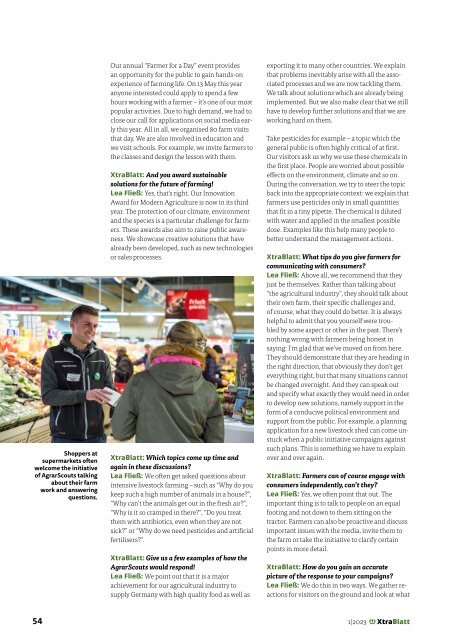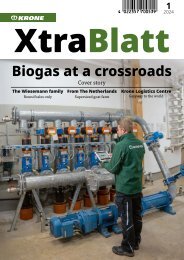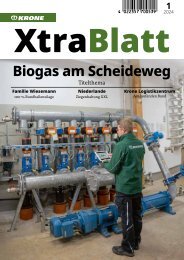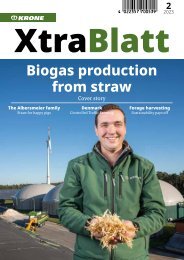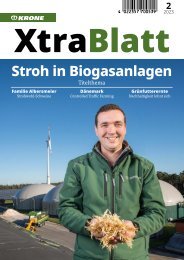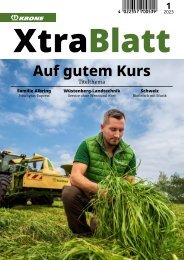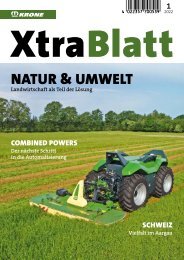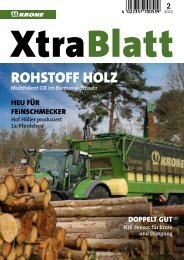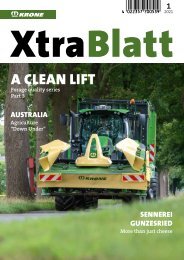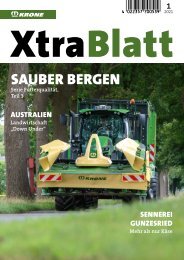XtraBlatt Issue 01-2023
You also want an ePaper? Increase the reach of your titles
YUMPU automatically turns print PDFs into web optimized ePapers that Google loves.
Shoppers at<br />
supermarkets often<br />
welcome the initiative<br />
of AgrarScouts talking<br />
about their farm<br />
work and answering<br />
questions.<br />
Our annual “Farmer for a Day” event provides<br />
an opportunity for the public to gain hands-on<br />
experience of farming life. On 13 May this year<br />
anyone interested could apply to spend a few<br />
hours working with a farmer – it’s one of our most<br />
popular activities. Due to high demand, we had to<br />
close our call for applications on social media early<br />
this year. All in all, we organised 80 farm visits<br />
that day. We are also involved in education and<br />
we visit schools. For example, we invite farmers to<br />
the classes and design the lesson with them.<br />
<strong>XtraBlatt</strong>: And you award sustainable<br />
solutions for the future of farming!<br />
Lea Fließ: Yes, that’s right. Our Innovation<br />
Award for Modern Agriculture is now in its third<br />
year. The protection of our climate, environment<br />
and the species is a particular challenge for farmers.<br />
These awards also aim to raise public awareness.<br />
We showcase creative solutions that have<br />
already been developed, such as new technologies<br />
or sales processes.<br />
<strong>XtraBlatt</strong>: Which topics come up time and<br />
again in these discussions?<br />
Lea Fließ: We often get asked questions about<br />
intensive livestock farming – such as “Why do you<br />
keep such a high number of animals in a house?”,<br />
“Why can’t the animals get out in the fresh air?”,<br />
“Why is it so cramped in there?”, “Do you treat<br />
them with antibiotics, even when they are not<br />
sick?” or “Why do we need pesticides and artificial<br />
fertilisers?”.<br />
<strong>XtraBlatt</strong>: Give us a few examples of how the<br />
AgrarScouts would respond!<br />
Lea Fließ: We point out that it is a major<br />
achievement for our agricultural industry to<br />
supply Germany with high quality food as well as<br />
exporting it to many other countries. We explain<br />
that problems inevitably arise with all the associated<br />
processes and we are now tackling them.<br />
We talk about solutions which are already being<br />
implemented. But we also make clear that we still<br />
have to develop further solutions and that we are<br />
working hard on them.<br />
Take pesticides for example – a topic which the<br />
general public is often highly critical of at first.<br />
Our visitors ask us why we use these chemicals in<br />
the first place. People are worried about possible<br />
effects on the environment, climate and so on.<br />
During the conversation, we try to steer the topic<br />
back into the appropriate context: we explain that<br />
farmers use pesticides only in small quantities<br />
that fit in a tiny pipette. The chemical is diluted<br />
with water and applied in the smallest possible<br />
dose. Examples like this help many people to<br />
better understand the management actions.<br />
<strong>XtraBlatt</strong>: What tips do you give farmers for<br />
communicating with consumers?<br />
Lea Fließ: Above all, we recommend that they<br />
just be themselves. Rather than talking about<br />
“the agricultural industry”, they should talk about<br />
their own farm, their specific challenges and,<br />
of course, what they could do better. It is always<br />
helpful to admit that you yourself were troubled<br />
by some aspect or other in the past. There’s<br />
nothing wrong with farmers being honest in<br />
saying: I’m glad that we’ve moved on from here.<br />
They should demonstrate that they are heading in<br />
the right direction, that obviously they don’t get<br />
everything right, but that many situations cannot<br />
be changed overnight. And they can speak out<br />
and specify what exactly they would need in order<br />
to develop new solutions, namely support in the<br />
form of a conducive political environment and<br />
support from the public. For example, a planning<br />
application for a new livestock shed can come unstuck<br />
when a public initiative campaigns against<br />
such plans. This is something we have to explain<br />
over and over again.<br />
<strong>XtraBlatt</strong>: Farmers can of course engage with<br />
consumers independently, can’t they?<br />
Lea Fließ: Yes, we often point that out. The<br />
important thing is to talk to people on an equal<br />
footing and not down to them sitting on the<br />
tractor. Farmers can also be proactive and discuss<br />
important issues with the media, invite them to<br />
the farm or take the initiative to clarify certain<br />
points in more detail.<br />
<strong>XtraBlatt</strong>: How do you gain an accurate<br />
picture of the response to your campaigns?<br />
Lea Fließ: We do this in two ways. We gather reactions<br />
for visitors on the ground and look at what<br />
our followers on social media are saying about us.<br />
And we also conduct online surveys. The results<br />
of these surveys highlight other topics which we<br />
aim to address in subsequent campaigns.<br />
That’s how we came up with climate protection.<br />
On the one hand, it’s a very obvious topic. On the<br />
other hand, we were surprised that the respondents<br />
didn’t perceive farmers as the main culprits<br />
but rather as part of the solution. This ultimately<br />
led to us planning the Klimaklo tour through<br />
Berlin. It was important for us to point out that<br />
agriculture cannot single-handedly solve the climate<br />
problem. We were able to engage effectively<br />
with the public because people already had a good<br />
understanding of this topic.<br />
<strong>XtraBlatt</strong>: What sort of reactions do you get<br />
from the public?<br />
Lea Fließ: Our activities are generally seen in<br />
a very positive light. People are happy to obtain<br />
concrete information from us on the subject.<br />
They appreciate the opportunity to talk directly<br />
to farmers and that we offer transparency and<br />
authenticity. That doesn’t mean of course that<br />
we always agree. In fact, we feed any criticism<br />
we hear to our members, although that’s not our<br />
main job. Yet, it’s important for people to express<br />
their criticism and talk to farmers about it.<br />
Only very rarely does it happen that our Agrar-<br />
Scouts are accused of animal cruelty or well poisoners.<br />
On the contrary, like I said, we find there<br />
is a great deal of understanding for the situation<br />
farmers are in – rising costs and financial pressures<br />
and all the responsibility their profession<br />
involves.<br />
<strong>XtraBlatt</strong>: What is the experience of the Forum<br />
with the media?<br />
Lea Fließ: I was somewhat surprised by the<br />
media’s understanding of the industry when I<br />
joined the German Forum for Modern Agriculture<br />
in 2<strong>01</strong>5. I’m sorry to say that many media outlets<br />
report about agriculture in negative terms. And<br />
it’s not often easy for farmers to live with that.<br />
But through our activities we can show that the<br />
majority of the population takes a much more<br />
positive view.<br />
Of course, the media has a duty to look at things<br />
critically. We see ourselves as educators in this<br />
situation. Our “Farmer for a Day” campaign, for<br />
example, always gets brilliant coverage in the<br />
local press and our Innovation Award is often<br />
covered by the national media. But there is still<br />
a lot more all stakeholders in the industry<br />
can do. «<br />
Visitors to the Event Farm at Grüne Woche show in<br />
Berlin enjoy the 360° VR farm life experience.<br />
The very popular “Farmer<br />
for a Day” campaign gives<br />
people an insight into dayto-day<br />
farming. In between<br />
sessions, there’s time to<br />
chat and ask questions.<br />
More<br />
reading<br />
Find out more about<br />
the German Forum for<br />
Modern Agriculture:<br />
www.modernelandwirtschaft.de<br />
‘modernelandwirtschaft’<br />
‘Die moderne<br />
Landwirtschaft’<br />
54 1|<strong>2023</strong> <strong>XtraBlatt</strong><br />
<strong>XtraBlatt</strong> 1|<strong>2023</strong><br />
55


